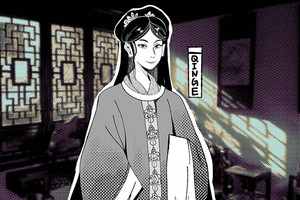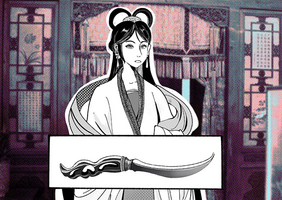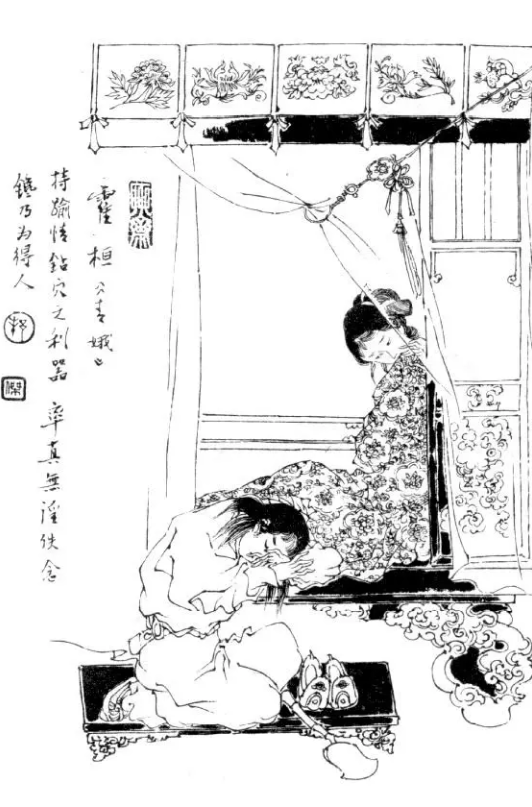The original story and notes on the culture behind it


About the author of the novel
Pu Songling (June 5, 1640 - February 25, 1715):
He was born into a family that had grown corrupt, and he was unable to use his talents because of the murky and devious nature of the academic and political world in ancient China. So he spent his life as a teacher in his hometown and lived a life of poverty. The reality of his downtrodden life made him think about the problems of society, and he collected folk tales and processed and organized them into a novel.
<Strange Stories from a Chinese Studio> exposes the darkness of feudal rule or rebels against the bondage of feudal rules, with rich and profound ideological content. The works depicting the theme of love are the most numerous in the whole book, and they show a strong spirit of anti-feudalism. Some of these works show the author's ideal love through the romance between demons and human beings.

The original text
This story depicts an ancient man named Huo Huan, who was intelligent, and whose mother over-indulged him, causing him to have no social common sense. He loved a woman named Qing E, but she refused to marry as she grew up learning fairy magic and was motivated to become a fairy. One day Huo Huan gets a prop that can dig up rocks. So he cuts through the wall of Qing E's house at night to spy on Qing E, changing her clothes and sneaking onto her bed while she is sleeping. Qing E found out and rebuked him. Later he tried to propose marriage to Qing E, but both families had a big fight over the matter.
In the end, they were married with the help of a local official. Qing E did not care about her family for the next eight years until one day, she told Huo Huan that they were never meant to be together again, and then she died that night. One day, Huo Huan got lost in the mountains while searching for the fish his mother wanted to eat. He found the territory of the gods by mistake and was surprised to find Qing E there. It turns out that Qing E became a fairy on the night she died, and then she defected to her father who also became a fairy. Huo Hwan tries to get Ching E to come home, but her father finds him and throws him out of the territory.
But Huo Hwan uses the prop that can dig up rocks to break through the wall of the territory and snatches Qing E back to her. So Qing E came back, and they went home to stay with Huo Huan's mother until she died and left again. Later, their two sons meet, and when they go back to their hometown to find their parents, they find that they have both become immortals. A narrator comments on the story: Huo Huan was a strange man who acted madly, and the Immortals set them up as a couple and made them live forever to honor their filial piety and respect for their parents.

Additional explanation of the story
1. Why does Qing E end up being a model of respect for parents?
The moral code of honoring one's parents has a deep influence in Chinese culture, which is called filial piety culture. Because ancient China was an agrarian society, people in ancient times divided interpersonal relationships by family, and the elders often had more experience in farming, could lead the family to survive for a long time, and had a high degree of authority in the family. Therefore, the culture of filial piety has evolved over time. Ancient rulers used this culture to enslave their people, and filial piety culture gradually became a class of bureaucrats in which subordinates had to obey their superiors unconditionally. So the story of Qing'e became a model of respect for parents, which was a noble honor in ancient times.
2. On the interpretation of marriage in ancient China.
From the ruler's point of view, ancient Chinese marriage was to keep the interests of each family tied together and maintain social stability. Therefore, in ancient Chinese marriages, sons and daughters obeyed their parents and maintained marital relationships that had no love . For example, if a man wanted to marry a woman, the man had to pay a bride price to the woman's family. The relationship between husband and wife in ancient China was cold, and society did not favor couples having strong feelings for each other. So that's why the author of the novel wants to break the traditional marriage and pursue freedom (here by default : men all over the ancient world had absolute power over their wives. In China the dominant power of the whole family over the individual is more emphasized).
Files
Qing E
This visual novel is adapted from classical Chinese novels <strange stories from chinese studio>.
| Status | Canceled |
| Author | Echokodoma |
| Genre | Visual Novel |
| Tags | Female Protagonist |
More posts
- Story creation ideas and sharing of prototypesSep 20, 2024